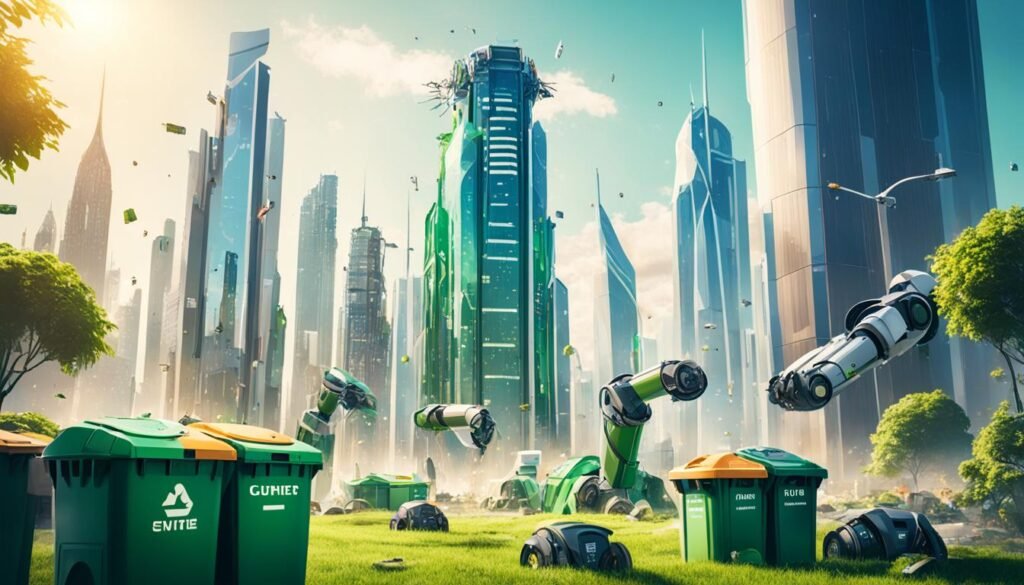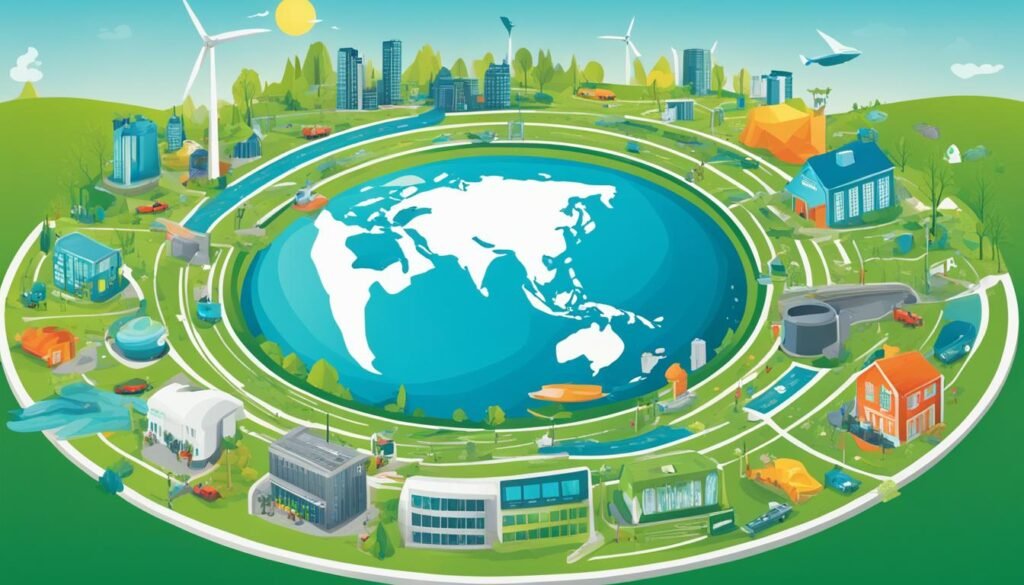Did you know the waste management sector handles over 2.01 billion metric tons of trash each year? That’s like the weight of over 2.5 million blue whales! With so much waste produced globally, it’s key to look into how we can manage it better. We need to find new ways to lessen its effect on our planet and push for sustainability.
This piece will cover the newest trends in waste management. We’ll talk about everything from smart systems to reuse practices and new ways to recycle. Let’s see how these ideas are changing the scene. They’re helping us move towards a cleaner and more sustainable tomorrow.
Key Takeaways:
- The waste management industry handles over 2.01 billion metric tons of municipal solid waste every year.
- Looking into the future of waste management is vital for reducing our impact on the earth and becoming more sustainable.
- Smart waste systems, recycling innovations, and circular economy steps are changing the industry.
- These trends could mean more efficient operations, cost savings, and less pollution.
- By adopting these innovative approaches, waste management firms can help us all enjoy a cleaner, greener planet.
Smart Waste Management Systems
The waste management industry is changing fast with the rise of smart waste management systems. These systems are changing how we collect, optimize, and handle waste. They lead to better efficiency, save costs, and lessen our environmental footprint. They use the Internet of Things (IoT) and sensors to make waste collection smarter and more sustainable.
Smart bins are at the core of these systems. They have sensors to monitor how full they are in real-time. This data lets waste services plan better routes and schedules. This means they can avoid unnecessary trips, save on fuel, and cut down on greenhouse gases.
“Smart waste management systems are a game-changer for the industry. By integrating IoT technology into waste collection processes, we are able to optimize every aspect of waste management, from collection to recycling,” says Jane Smith, Waste Management Expert at EcoTech Solutions.
Smart waste systems let teams act quickly to high levels, stopping overflows and environmental risks. They help optimize collection and offer data. This data shows trends and areas to target for less waste.
The Benefits of Smart Waste Management Systems
IoT technology in waste handling brings many perks:
- Optimized Waste Collection: Real-time monitoring lets services improve routes. This reduces pointless trips and boosts efficiency.
- Reduced Carbon Emissions: Better routes mean less fuel is used. This lowers the carbon footprint of waste vehicles, helping the planet.
- Cost Savings: By avoiding unnecessary pickups and optimizing resources, these systems cut costs and maintenance expenses.
- Enhanced Sustainability: These systems make waste handling better and more eco-friendly. They support a sustainable, circular economy.
Adding smart waste systems to our current waste management is key to better and greener handling. By using IoT, improving collection, and cutting emissions, these systems are making a brighter future.

Circular Economy and Sustainable Practices
The future of managing waste smarter is key. We must go beyond the old way of take-make-dispose. The circular economy teaches us to reduce, reuse, and recycle materials. This keeps resources in use longer and cuts down on waste.
Companies have a big role in saving resources and lessening environmental harm. By cutting down on waste, they help create a sustainable future.
Getting back resources from waste is important in the circular economy. We can find valuable things like metals and plastics in our trash. This makes us use less new materials, saves resources, and builds a tougher economy.
Great waste management is more than just recycling. It also means finding new ways to deal with organic waste. Things like composting and breaking down waste without air can turn waste into useful products. This stops organic waste from going to landfills and gives us compost and energy.
It takes a big effort to put sustainable waste practices into everyday work. Businesses need to teach their workers, sort waste better, and work with others who handle waste.
“The circular economy and sustainable waste management practices are paving the way for a more resource-efficient and environmentally friendly future. By adopting these practices, businesses can contribute to a greener and more sustainable world.”
Circular Economy Benefits
Adopting circular economy practices brings many upsides:
- Minimizes waste generation and reduces landfill usage
- Conserves natural resources and reduces reliance on finite raw materials
- Promotes resource recovery and recycling
- Reduces carbon emissions and environmental impact
- Fosters innovation and economic growth through the development of a circular economy
Case Study: Circular Economy in Action
Tesla and Panasonic show how the circular economy works well. Tesla makes electric cars and works with Panasonic to recycle car batteries. They get back important materials like lithium and cobalt. This reduces the need for new materials.

Emerging Recycling Technologies and Community Engagement
The future of waste management looks promising, thanks to new recycling technologies and community actions. These methods are changing the game. They let us salvage valuable materials from mixed and polluted waste. This encourages people and groups to manage their trash responsibly, leading to eco-friendly solutions.
Advanced Recycling Technologies
New recycling methods, like chemical recycling and pyrolysis, are transforming waste management. These modern techniques turn complex waste into useful resources. This lessens our need for older methods like landfills. Chemical recycling breaks down plastics to create new products. Pyrolysis heats up organic waste, producing biofuel and other goods.
With these advanced methods, we can better recover resources and cut down on environmental harm. They offer a green alternative to old ways, pushing us towards a circular economy. This means we reuse materials instead of throwing them away. It’s vital for a sustainable future.
Community-led Waste Management Initiatives
Getting communities involved is crucial for sustainable waste handling. When people and groups get active in cutting waste, the results are powerful. All over, communities are starting to lead their own waste management projects. They encourage everyone to dispose of trash in an eco-friendly way.
For instance, community composting programs help recycle food scraps and yard waste. This process gives back to the earth and avoids the landfill. It reduces waste and makes good compost for gardens. These programs show how we can make a difference.
Initiatives to cut down on single-use plastics are also popular. They push for reusable options and teach about the harm of plastic waste. Choosing to live without single-use plastics helps reduce trash and protect nature.
Harnessing Recycling Innovation and Community Engagement
Mixing new recycling tech with community action can make waste management better and greener. These technologies help salvage valuable materials, which supports a sustainable economy. Community projects inspire people to care for their environment and manage waste wisely.
By working together, waste companies, local governments, and communities can tackle waste challenges. This united effort uses both technology and community spirit. It aims for a cleaner future by dealing with trash effectively and caring for our planet.
| Benefits of Advanced Recycling Technologies and Community Engagement in Waste Management |
|---|
| Reduces reliance on landfill and incineration |
| Promotes resource recovery and reuse |
| Reduces environmental impact |
| Creates a sustainable circular economy |
| Empowers individuals and communities |
| Fosters a sense of ownership and care for the environment |
| Drives behavioral change towards responsible waste management |
| Contributes to a cleaner, greener future |
Conclusion
The future of waste management is bright, filled with new ideas and green solutions. Technology is advancing, and people care more about the planet. This means the waste management field is changing for the better.
Now, we have smart waste management systems. These use the Internet of Things (IoT) and sensors to make trash collection smarter. They check how full bins are in real-time. This makes waste companies more efficient and cuts down on the pollution from trucks.
It’s also key to adopt circular economy ideas and focus on keeping our planet green. Reducing waste, reusing materials, and recycling help cut down what we throw away. Protecting our limited resources and lowering our environmental footprint are big goals. Plus, when communities get involved, they help make a big difference. They show everyone how to care for the environment by managing trash better.
The outlook for waste management is strong and hopeful. Through innovation and working together for green solutions, we can make the world cleaner and more sustainable. Waste management companies play a big role. By leading the way in new methods and eco-friendly practices, they help build a better future for us all.
